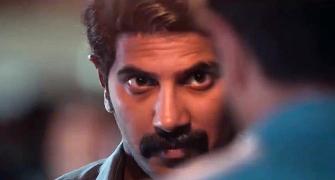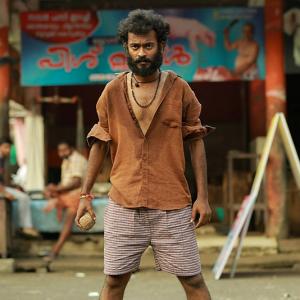... And it's written with tears, blood and unspoken lines, notes Sreehari Nair.
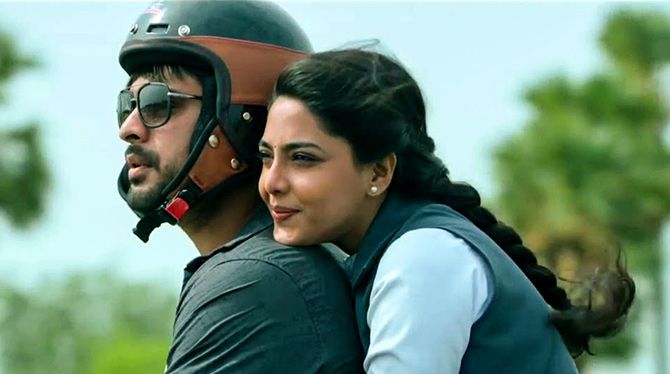
IMAGE: The beauty of Mayaanadhi is that it shows the guts to be a love story of two people who have exhausted the surprises they can offer one another.
(A note from Sreehari: This article and the movie it endorses can be better enjoyed by submitting yourself to the spoilers and knowing as many of them as possible, in advance.)
Aashiq Abu's Mayaanadhi can either give greeting card companies the jitters or it can give them a new pitch.
For the less ambitious card companies, there's already help at hand, with the party-line out with such classifications as 'doomed romance' and 'unconventional love story' -- as if they still have Sairat chewing at their expectations.
But Mayaanadhi beats all that and goes a little further, cuts a little deeper.
It may be the only Indian motion picture that shows us how truly corrosive love can be, while not forgetting to suggest how very essential love is.
Critically speaking, what has been pointed out as a marker of the movie's impotence is perhaps its biggest strength.
Riding on Godard's Breathless, Mayaanadhi makes the same stops -- a small hood with blood on his hands; a team of cops that's manhunting for the hood; and the hood's girl who turns him in. But by the end, it manages to wholly and beautifully re-imagine Breathless.
Abu and his writers (Syam Pushkaran, Dileesh Nair) replace Godard's living-for-the-moment generation with people who have inner lives, external goals, who're throttled by opposing forces, and who, whilst they're being broken are trying hard to stay one piece.
Pushkaran, who has co-authored the film, is without doubt the country's finest dialogue writer and what makes his lines bite is their John O'Hara-esque economy.
With one back-and-forth, a casual quip, and sometimes with just a word, Pushkaran manages to extend the bounds of his characters and summarise their many disillusionments.
In Mayaanadhi's best scene, after they've used the girl to arrest her lover-boy, the two manhunting cops -- a new recruit and an old hand -- who up until that point are shown to engage in an intense race for the torch of masculinity, argue about the current situation while positing about what each would have done if 'they were the girl'.
'If I were the girl, I would have caved in,' confesses the new recruit.
'If I were the girl, I wouldn't have,' says the old hand.
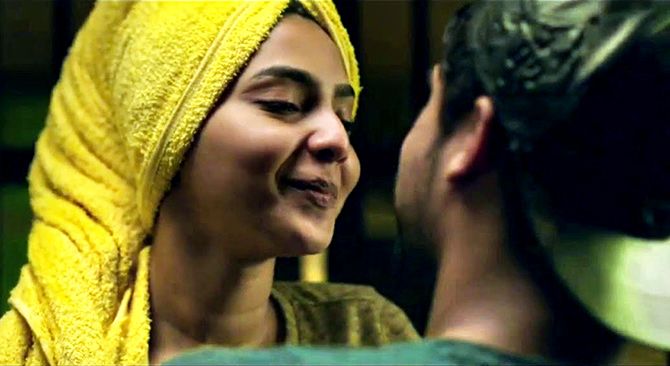
IMAGE: Aparna or Appu has a Russian Doll's interior architecture. Aishwarya Lekshmi turns in a performance that in conveying her character's divided spirit also becomes the spirit of this age.
The truth is, they're nothing like the girl, Aparna (Appu), who has a Russian Doll's interior architecture (she is many people inside a person), and who almost like good Russians, believes that it's better to die than to kiss without love.
A struggling actress, Appu knows a cliche when she hears one, sees one, but has now resigned to the fact that life perhaps isn't a war against cliche.
So she works up a professional smile and a professional voice (years of emcee-ing have supplied her with the necessary intonations). But at acting auditions that are ruthless toward unfelt shallowness, she seems too worked-out-in-advance to be a contender.
To act real, she has to feel real, and to feel real, she has to be brought in contact with every wound that's bandaged, everything that's prickly, glossed over, tap danced over five days a week.
When pushed to the wall, she goes from 'Engineering Graduate' to 'Engineering Dropout'; is disgusted by her friend's show of vanity but stops to say Nice; and converses with her mother in a way that only mothers and daughters do, through a loop-show of passive-aggressiveness.
Every hollow smile, every practiced, confident strut kills her; and when at an audition she comes face-to-face with an established actress, Aparna Balamuraly (who's also there for the audition), Appu even loses her name.
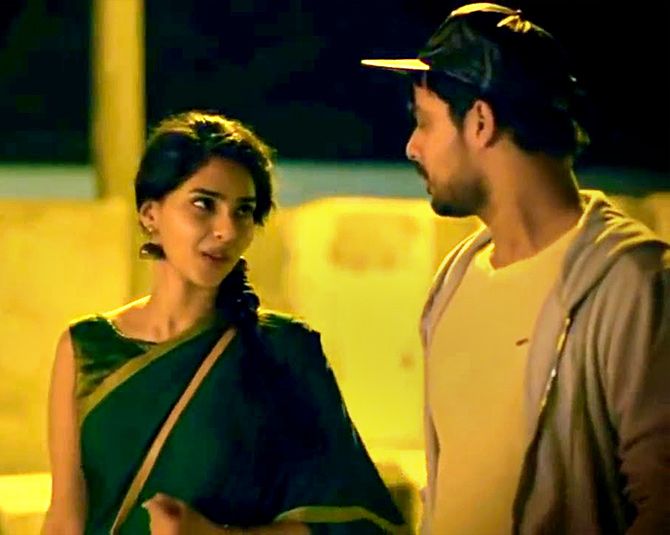
IMAGE: Tovino Thomas's turn as Maathan is devastating because he holds the screen like few actors can, while seemingly trying to escape it.
Aishwarya Lekshmi as Appu turns in a performance that in conveying her character's divided spirit also becomes the spirit of this age.
In flashbacks, watching her as a young college girl, you discern in her the self-absorption of youth. She is unaffected by the gazes, she is her environment.
But as the Appu swimming in the river of becoming, she seems magically free of that heedlessness, constantly checking for her position in the scheme of things.
This is a re-imagining of Breathless, but Appu's the one who appears at the edge of being winded.
We don't judge her, or for that matter anybody, because the film is steadfast about explaining all its characters 'in their own terms' -- this is a piece of work that doesn't yearn to be important, it merely wants us to get up-close and tight.
To really understand the boy, Maathan (played by Tovino Thomas), you have to see him in the context of his first meeting with Appu.
There she is, denied her cup of tea at an audition, denied her lime juice at her friend's place, and denied her plate of fried rice at a wedding (the rice she won't have because she's the sort that would rather go hungry than have banal food; later, she invokes that same side when turning down a supporting role in a fantasy film).
There's Appu at her lowest ebb and Maathan walks in -- as he has, probably a hundred times before. And while he doesn't make her day any better, he lets her unload herself upon him.
He is the masochist who skulks unmarked in Brando caps from The Wild One, running from one loss of grace to another, a bunch of shady deals the salient features on his resume and now a policeman's killing an added item, and he becomes her meal.
Back in college, he was her super-senior, her hero who introduced her to the world, but now she has his number.
'Maathan, both you and I know you're a charm, but trust once broken cannot be restored,' she reprimands him, while reminding him of a money-related deal that had soured their relationship.
He though has no grand judgments, only small observations to make.
'Have you corrected your smile?' is one of his conversation starters.
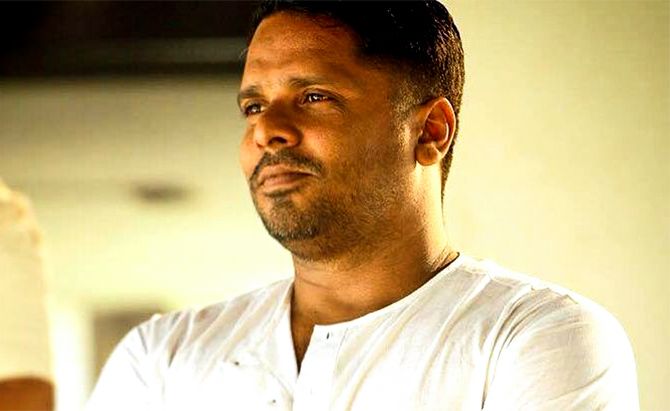
IMAGE: In Mayaanadhi, Aashiq Abu makes his first sustained piece of cinema, and he does so, by giving the tasteless, the inexplicable, the half-formed, and the mysterious, their absolute due.
The beauty of Mayaanadhi is that it shows the guts to be a love story of two people, who have exhausted the surprises they can offer one another.
Appu and Maathan may know each other so intimately as to be bored, but so comfortable they are in each other's breathing space that they can afford to be openly bored when together.
While parked cars and cyber cafes once played host to their hot daytime lovemaking, they now live by the night.
Aashiq Abu and cinematographer Jayesh Mohan shoot Kochi as a city gradually waking up to the concept of 'night life' and Appu and Maathan waltz through Kochi's nerve-centres like its maiden nocturnal creatures.
What becomes clear to you, 30 minutes into Mayaanadhi is that this is a world that has been carefully made before cinema can enter it and explode its borders.
And in Abu's and Jayesh Mohan's vision, this also happens to be a sponsored happy world of self-help posters and hotel towels arranged like swans; where consumerism's ultimate reward, earned through cold, cut-throat competition, is a bubble-bath.
Maathan is a natural slave to the dreams that such a world generate, but there's nothing callous about him (The movie opens with his voice playing over a black screen as he admits: 'I am living in the future').
Appu describes him as a Survivor, but in his heart of hearts, Maathan knows he has used up his chances.
A survivor with the dependability of a kid, he pees from the balcony and later tries to make small-talk with a cop -- the cop who's writing his death-certificate, and he asks him about his bulging biceps.
Tovino Thomas' turn as Maathan is devastating because he holds the screen like very few actors can, while seemingly trying to escape it.
You believe in him, both when he hints at enormous reserves of grace and when seems totally devoid of it.
Life has turned for these romantics and nobody embodies this fact better than Maathan's old Master -- a wily fox who now runs a travel agency -- who stops him in his tracks to tell him, 'There's no 'Master' no more. Master's dead.'
And then, in a moment to put beside all those great moments from the history of cinema, the Master plucks off Maathan's cap as he dozes in his car, wears the cap, and continues to drive. The mumbling apprentice and his dead master, and a cap that gracefully changes heads as a tribute to old times!
Mayaanadhi, in the heritage of the best Malayalam films of last three years, is less plot-driven and more character and atmosphere-driven. (The spirit of Robert Altman seems to have descended upon Malayalam Cinema of late).
And the movie feels alive because you learn more about each character from the other characters, as they give us their versions of one another, and before you know their skewed perspectives culminate in a catastrophe.
To the cops who handcuff Maathan inside their jeep, his dapper standards of living (Maathan's home is described as a Duty-Free Shop) is perhaps as big a sin as his accidental killing of their subordinate.
Their contempt for him is born both out of knowing his crime and not being able to fathom his style.
'How can he go on living so coolly after committing such a heinous act?'
Aashiq Abu, who has introduced some of the best talents to come out of Malayalam, has never before this, directed a movie with no pretensions and absolutely no disaffections.
There's even a joke among my friends that Abu's greatest output to date is maybe Dileesh Pothan.
In Mayaanadhi, Abu makes his first sustained piece of cinema, and he does so, by giving the tasteless, the inexplicable, the half-formed, and the mysterious, their absolute due.
He was always bright; this is the first time he tries for depth.
The narrative is full of mirrors, but Abu isn't asking us to appreciate his cleverness, no. The ironies he's presenting aren't straightforward, and there are more dimensions than you can keep track of.
A brown shoe indicates the onset of authority and later a shot of the two lovers' fancy footwear as they almost air-walk beside each other suggest their reducing detachment.
The cops' chase of Maathan is driven by the same ethos of comradeship that Maathan, in the beginning, says, is missing in the underworld.
And the film opens with Maathan's dreams and ends with Appu achieving hers.
Mayaanadhi has evidently been put together to Rex Vijayan's score, and the music here is an active participant in the lives of the characters. It's not a sundry score as in Angamaly Diaries; instead offering us variations of the 'mystical' -- it's the music of trepidation, of making peace, of intuitions, and of the sudden outpouring of emotions.
This has to be the most shamanistic of Indian movie soundtracks.
The score, though brilliant, creeps up in a sex scene, and mildly destroys it. The pre-coital sequence there has great erotic and emotional tension, but when the actual ritual begins, it feels too set to a rhythm for it to be rendered frank.
The movie is so genuinely respectful of the fuzziness in every moment and in every character interaction, that even the slightest of handholding hits you as more fake than it ought to.
A scene of Appu acing her audition is 'guided' to the point that it plays out like an outtake from a fairness cream commercial.
And much has been made of a post-coital line, when Appu grinds Maathan down, as he's making grand plans.
'Sex is not a Promise,' says Appu, and feminists have raised that retort (and frankly reduced its power by doing so), to the status of a poster-line for their movement. Which it isn't; but what it is, is a beautiful testament to Appu's complexity -- just an attitude she feels at that moment and not a life-lesson to be emblazoned over a cork-wall.
The more revealing of their intimate moments, in fact, happens a few beats prior to the crowd-pleaser when Maathan tops off the sex with a 'Thank You,' and Appu whispers, ever so softly, 'Okay.'
Unfurling against a microcosm of the Malayalam film industry, the movie is roughly about Appu and Maathan's one last dance with the cops' hunt for Maathan happening in parallel.
And what gives this narrative its real, simmering tension, I think, is its courage to suggest that a woman can (and this is something very few men are capable of) continue to love her man while seeing him as an inconvenience.
This isn't a sign of compromise but the essence of modern relationships where women wield all the power -- they are both goddesses and mother hens; both the Strindbergian broads who played power games, and the romantic naives of the Henry James tradition.
In contrast to the Appu of her college years, the Appu of the present day doesn't place love before honour.
And a Maathan who can never quite understand this (though he tries hard to), she wants to hurt to the point that he wouldn't return... but he keeps returning.
What sneaks upon us in Mayaanadhi is that its final, climatic tragedy doesn't feel like a jolt but a natural progression.
This is possibly the only tragedy in Indian cinema that takes its shape from a slow erosion of values and a gradual accretion of bad habits.
We know Maathan has it coming and when he breathes his last, creating a rustling through the leaves, it is about as satisfying as it is heartbreaking.
In her effort to hurt Maathan, Appu finally locks him in a place of no return, but it's Maathan's victory: for she doesn't manage to hurt him enough.
Breathless ended with the Jean-Paul Belmondo’s character, in his dying moments, saying to his girl, Patricia: 'You really are a bitch.'
Even the most seminal of the French New Wave films didn't dare to give its hood an all-accepting goodbye. But Mayaanadhi dares.

